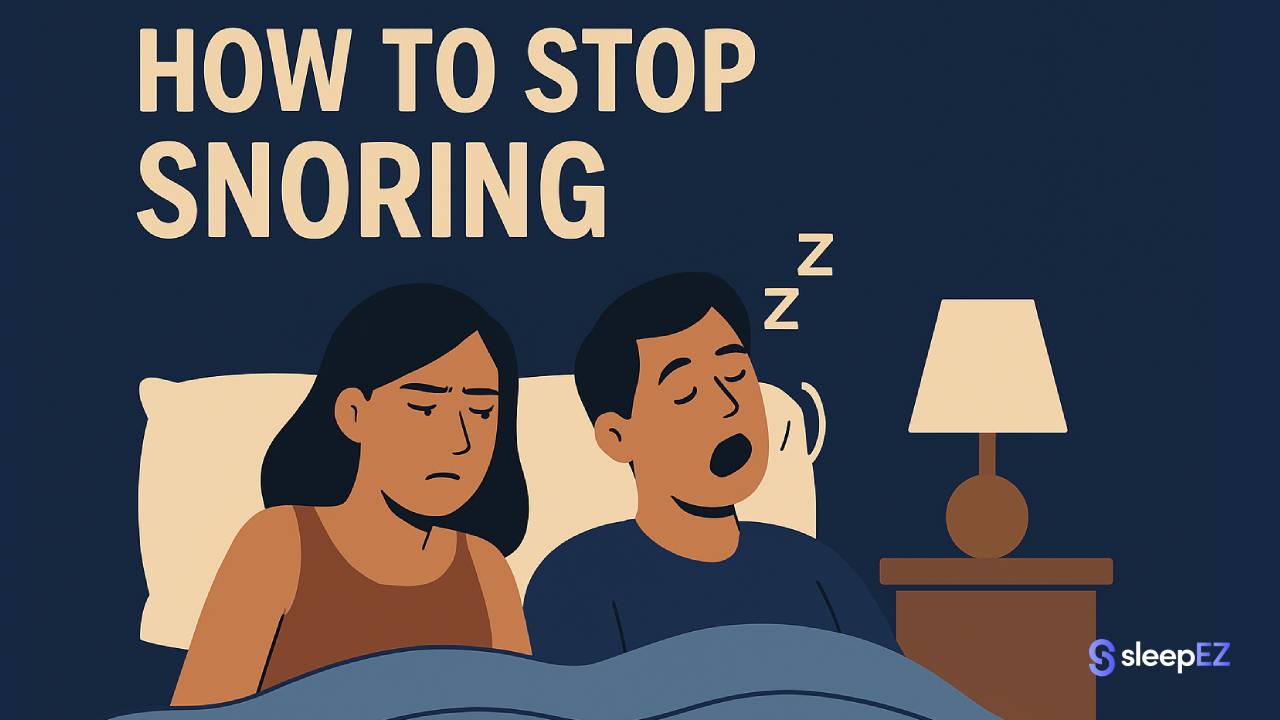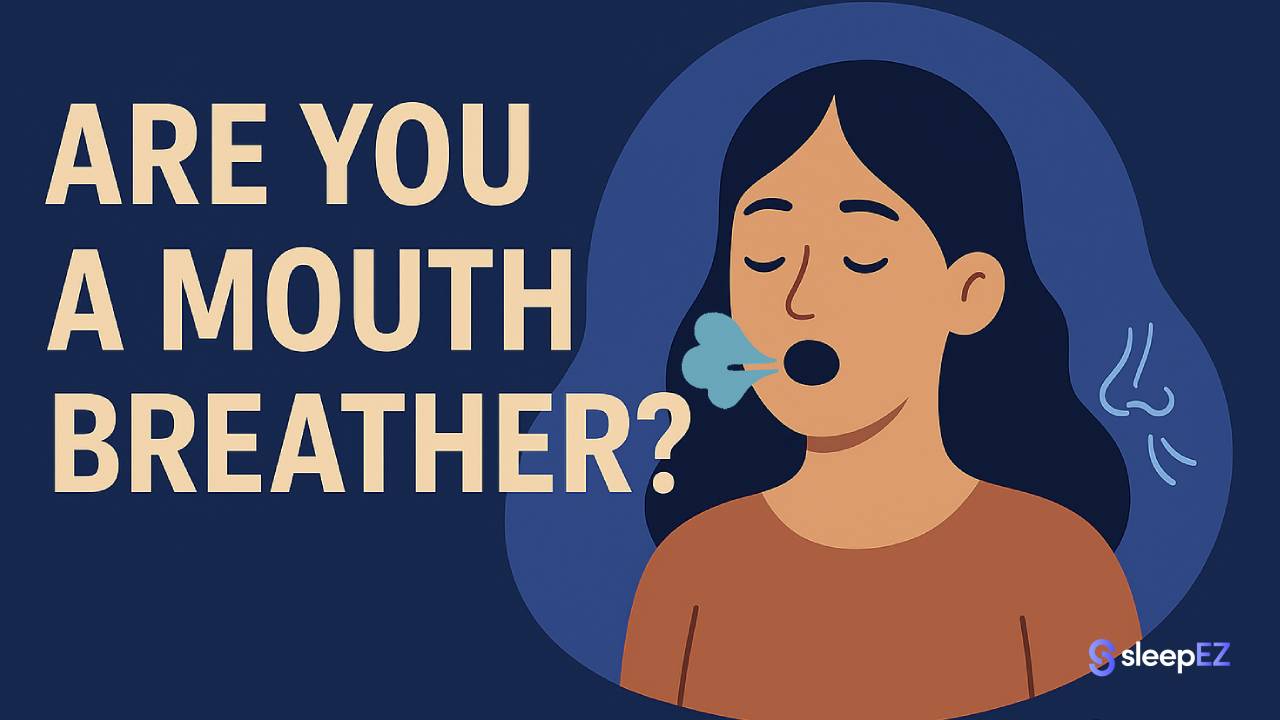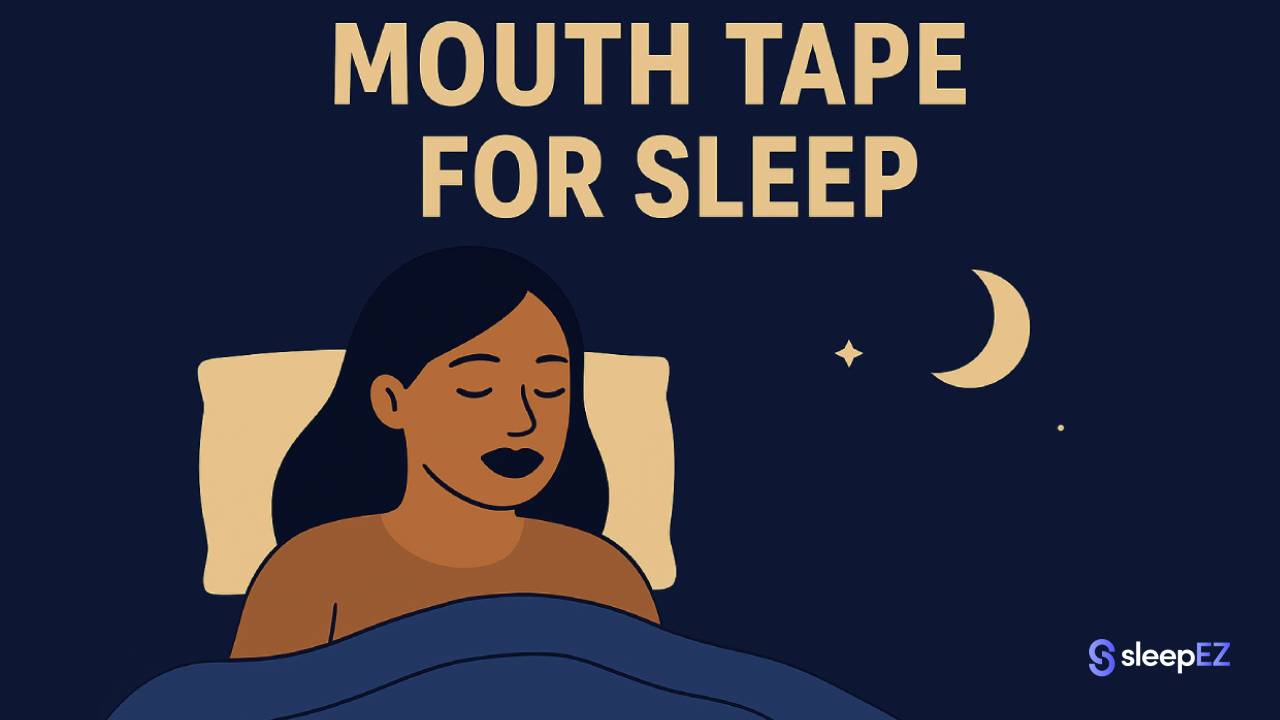The nightly rumble of snoring can disrupt sleep for you and your partner. If you're wondering how to stop snoring, the good news is, for many people, it's a solvable problem.
Snoring has many causes, so the best solution depends on what's creating the noise in the first place. Some people respond to simple habit changes. Others need a specific tool or device.
This guide covers 10 methods, from free lifestyle adjustments to effective products you can try tonight.
Why You Snore?
Snoring is the sound of tissues vibrating in a narrowed airway. When you sleep, the muscles in your throat relax. If your airway becomes too narrow, the air passing through causes surrounding tissues to vibrate.
Common causes include:
- Mouth breathing – Breathing through your mouth instead of your nose during sleep
- Sleep position – Lying flat on your back allows the tongue to fall backward
- Nasal congestion – Blocked nasal passages force you to breathe through your mouth
- Excess weight – Extra tissue around the neck can narrow the airway
- Alcohol and sedatives – These relax throat muscles too much
Understanding your cause helps you pick the right fix.
10 Effective Methods to Help Stop Snoring
Now that you know what causes snoring, here are 10 effective ways to address it. We've organized these from simple lifestyle changes you can make tonight to tools and devices that target specific causes.
1. Change Your Sleep Position
Sleeping on your back is one of the biggest snoring triggers. Gravity pulls your tongue and soft palate backward, partially blocking your airway.
Try sleeping on your side instead. You can use a body pillow to stay in position, or sew a tennis ball into the back of your pajama top to make back-sleeping uncomfortable.
Many people see immediate improvement from this change alone.
2. Elevate Your Head
Raising your head by about four inches can help keep your airway open. The slight elevation prevents tissues from collapsing backward.
You can use an extra pillow, a wedge pillow, or adjust your bed if it's adjustable. Just avoid propping your head at an extreme angle, which can create new pressure points and discomfort.
3. Limit Alcohol and Sedatives Before Bed
Alcohol and sedatives relax the muscles in your throat more than normal sleep does. This extra relaxation increases the chance of airway narrowing and tissue vibration.
If you drink, stop at least three hours before bedtime. You'll likely notice your snoring reduces or stops entirely on nights when you skip the nightcap.
4. Maintain a Healthy Weight
Excess weight, especially around the neck and throat, can put pressure on your airway. Even a small amount of weight loss can make a significant difference for some people.
This doesn't mean you need dramatic changes. Losing just 10% of your body weight can reduce snoring or eliminate it completely if weight is a contributing factor.
5. Stay Hydrated
When you're dehydrated, the secretions in your nose and soft palate become stickier. This creates more resistance in your airway and increases snoring.
Drink plenty of water throughout the day. Women should aim for about 11 cups daily, men about 16 cups. You'll know you're well-hydrated when your urine is pale yellow.
6. Encourage Nasal Breathing with Mouth Tape
If your snoring is caused by mouth breathing, this is one of the most direct solutions.
Mouth tape gently keeps your lips closed during sleep, redirecting airflow through your nose. When you breathe nasally, your tongue naturally positions forward and up against the roof of your mouth. This prevents the throat tissues from vibrating and creating that snoring sound.
The method is simple and non-invasive. You apply a small piece of tape across your lips before bed. Your nose handles all the breathing work, which is what it's designed to do.
Many mouth breathers wake up with a dry mouth, sore throat, or feeling unrested. Switching to nasal breathing often fixes these issues along with the snoring.
For this method, using a purpose-built tape is key. The SleepEZ Mouth Tape is designed for comfort and a secure seal. It's gentle enough to remove easily but strong enough to stay in place all night.
7. Open Nasal Passages with Nasal Strips
Nasal strips work by physically opening your nostrils from the outside. They're adhesive strips you place across the bridge of your nose that gently pull your nasal passages open.
This method helps if your snoring is caused by nasal congestion or naturally narrow nasal passages. The strips create more space for air to flow through your nose, reducing the need to breathe through your mouth.
They're a good option to try before bed if you're congested from allergies or a cold.
8. Use an Anti-Snoring Mouthpiece (Oral Appliance)
Anti-snoring mouthpieces reposition your lower jaw slightly forward. This pulls the tongue forward too, which helps keep your airway open.
These devices, also called mandibular advancement devices, can be effective but often require fitting by a dentist for the best results. Over-the-counter versions are available, though they may be less comfortable.
If you grind your teeth or have jaw issues, talk to your dentist before trying one.
9. Combat Dry Air with a Humidifier
Dry air irritates the membranes in your nose and throat. This irritation can cause swelling and congestion, which narrows your airway and increases snoring.
A humidifier adds moisture to your bedroom air. This soothes your airways and can reduce congestion-related snoring. Clean your humidifier regularly to prevent mold and bacteria growth.
Aim for a humidity level between 30% and 50% in your bedroom.
10. Talk to Your Doctor to Rule Out Sleep Apnea
Not all snoring is simple snoring. Sleep apnea is a serious medical condition where your breathing repeatedly stops and starts during sleep.
Warning signs include:
- Loud snoring combined with gasping or choking sounds
- Silent pauses in breathing (often noticed by a partner)
- Waking up gasping for air
- Excessive daytime sleepiness despite sleeping a full night
- Morning headaches
- Difficulty concentrating during the day
If you have these symptoms, see a doctor. Sleep apnea requires medical diagnosis and treatment. The most common treatment is a CPAP machine, which keeps your airway open with gentle air pressure.
Left untreated, sleep apnea increases your risk of high blood pressure, heart disease, stroke, and diabetes. Don't ignore the signs.
Which Snoring Solution is Right for You?
Use this quick guide to identify your best starting point:
| Your Situation | Try This First |
|---|---|
| You wake up with a dry mouth or sore throat | Mouth Tape |
| Your nose feels stuffy at night | Nasal Strips or Humidifier |
| You only snore when sleeping on your back | Change Sleep Position |
| You gasp for air or stop breathing in your sleep | See a Doctor Immediately |
| You drink alcohol in the evening | Limit Alcohol Before Bed |
| You're overweight | Focus on Weight Loss |
Take the First Step Toward Quieter Nights
Finding the right solution may take some experimentation. Every person's snoring has different causes, so what works for someone else might not work for you.
Start with the simplest lifestyle changes. Adjust your sleep position, limit evening alcohol, and stay hydrated. These cost nothing and you can start tonight.
If your snoring is related to mouth breathing, consider trying mouth tape for a direct approach. Many people find that switching to nasal breathing solves not just their snoring, but improves their overall sleep quality.




Leave a comment
This site is protected by hCaptcha and the hCaptcha Privacy Policy and Terms of Service apply.